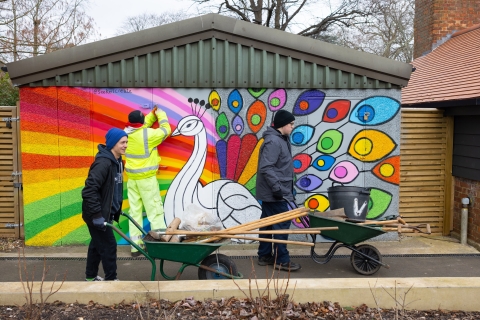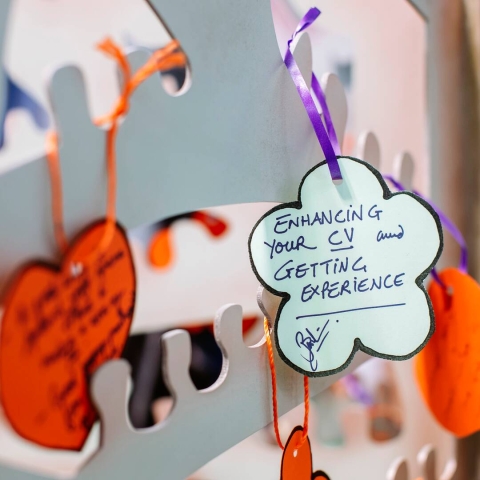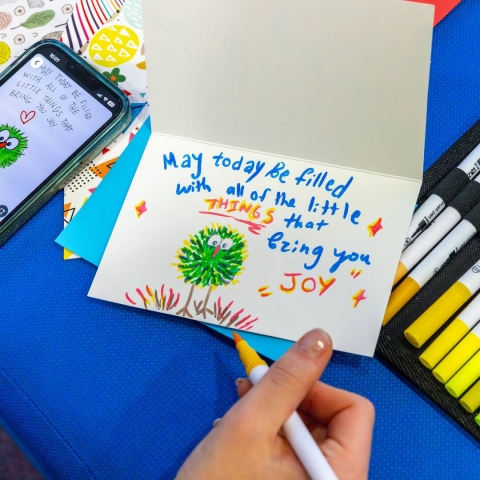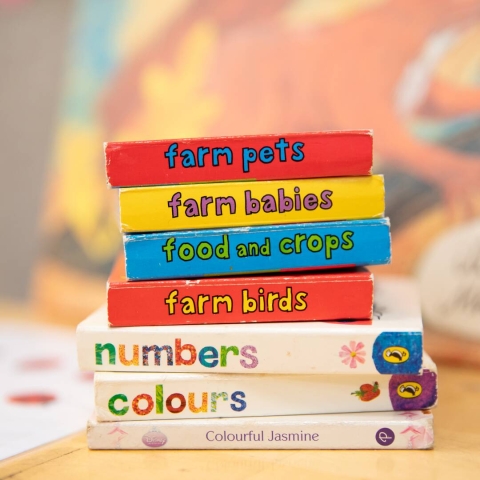

Find and apply for volunteering opportunities
Develop yourself, enrich your learning
Volunteering helps you build skills, apply your knowledge and gain work experience. It’s also a chance to make a positive impact in your community. Our Volunteering Team can help you find the right opportunity - whether it’s linked to your course, career goals or a cause you care about. Each year, we promote over 200 volunteering roles from more than 100 not-for-profit organisations. Opportunities range from one-off activities to regular commitments.

Join us for a week of one‑off volunteering activities that are hands‑on, sociable, and a great way to meet people while giving back.
Get Involved
Last academic year over 700 students got involved in regular and one-off volunteering opportunities to support the local community. Visit MyCareer today and find a volunteering opportunity that is right for you. Find out more about your options:
Benefits of volunteering
Whether you decide to do a one-off activity or regularly give your time, there are so many benefits:
- gain experience to enrich your CV
- improve your self-esteem, confidence & wellbeing
- try out possible career paths
- apply your course knowledge to real-life situations
- work towards The Portsmouth Award
- step away from campus and do something fun in the community
- support a worthwhile cause
- meet people from different backgrounds
Volunteering can also help in other ways such as professional references, networking opportunities, training opportunities and more. Make the most of your time volunteering. The more you put into your experience, the more you will benefit.
Types of opportunities
We have lots of different projects you can get involved with, depending on what motivates you. You could do something that is connected to your course, future career aspirations or a personal interest in a cause or activity.
Places you could volunteer include:
- cultural venues, such as museums, art galleries and libraries
- public sector organisations, such as the Police, schools, local council and hospitals
- charities that help improve the lives of vulnerable adults, families or children
- justice services, whether supporting victims, rehabilitating offenders or in prisons
- events such as the Great South Run, cultural festivals or family fun days

Thinking about volunteering abroad?
Check our guide for International Volunteering Opportunities and learn all the things you need to consider.
Become a Volunteer Champion
If you’ve volunteered while at University and are passionate about social action, you could become a Volunteer Champion. Your insights can inspire other students to volunteer and make a positive social impact.
Find out more and become a Volunteer Champion by visiting MyCareer.

Every Wednesday I volunteer with Life and Chimes at Pompey in the Community, having tea and cakes with older people living with early-onset dementia. It’s honestly one of the highlights of my week. I’m studying at university and also work part-time as a carer, so my schedule is pretty packed, but this feels different. It’s a calm space where I can just slow down and be present with people. This experience has definitely shaped how I think about my future. Studying gives me the science behind how conditions like dementia work, but volunteering shows me what it actually means for someone to live with it day to day. It's made me more patient and more aware of how important kindness and consistency are in care.
Volunteering Support available
Select the sections below to learn how we can support you
- All one-off and regular volunteer opportunities can be found on our Volunteering Bank. Click on ‘Get Involved’ for a full list of opportunities on MyCareer
- Can’t find what you’re looking for? Get in touch through volunteering@port.ac.uk with your questions.
- Our Work Experience Festival takes place each autumn. It is a one-stop shop for all students looking to gain some work experience or secure a part-time job. Meet voluntary-sector organisations and local part-time employers who are keen to recruit our students. Check out the Work Experience webpage to find out more about this event.
- Each year we celebrate Student Volunteering Week. It’s a chance to connect with local charities and not-for-profits offering volunteering roles
- When you apply on MyCareer, you’ll complete a short registration form so we can track your progress and contact you throughout your journey to offer ongoing support.
- Depending on the organisation’s needs, you may be asked to either submit an Application Form, CV and Cover Letter or complete an Online Application. Specific details are outlined in each role advert.
- Already applied? Let us know how things are going. If needed, we can get in touch with you directly with more help.
- If you need to find a volunteering opportunity for a short-term placement or work-based learning module, the Volunteering Bank can help! The Volunteering Team can help you find suitable opportunities and send an overview of your placement requirements to the organisations with your application. Find tips on how to approach your short term placement research on our website.
- If you are studying on a Student Route visa, you will have working restrictions while you are studying in the UK. Voluntary Work is included in this. Find out more information about volunteering as an International Student.
University of Portsmouth London Campus Students
For students who are studying at the University of Portsmouth’s London Campus, there are local organisations that can help you find volunteering opportunities:
- London Volunteering Team - the Mayor of London’s volunteering team. Visit their website to find volunteering roles and start making a difference in your local community
- Hands on London - They aim to promote volunteering and community service as a central aspect of life in London
- Do-it - a national database connecting volunteers to a wide range of organisations inside and outside of London
- Reach Volunteering - a national organisation focused on placing skilled volunteers into placements such as trusteeships
Contact the Volunteering Team
If you've got any questions about volunteering, contact the Volunteering Team at volunteering@port.ac.uk
Get more guidance on jobs and work experience
Part-time jobs guide
Learn how we can support you with securing paid, part-time work while you study.

Placements
Increase your employment opportunities and strengthen your skills by completing a placement.

Working globally
Get experience working abroad during your vacations or when you graduate with our global job-hunting resources.

Enable University alerts
Turn on notifications for critical updates like closures, safety alerts, and urgent service disruptions.








